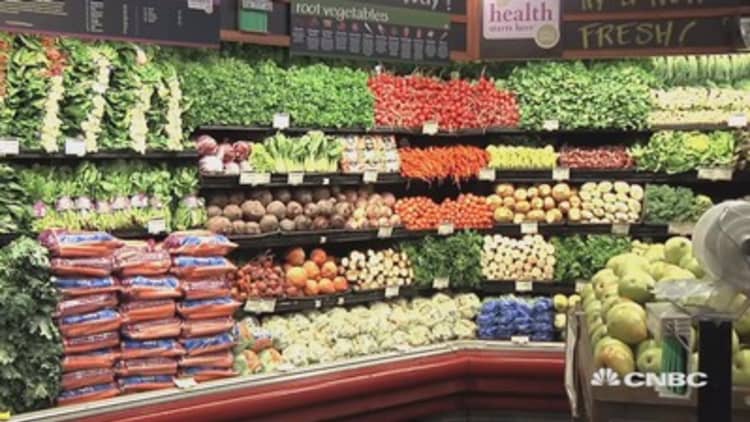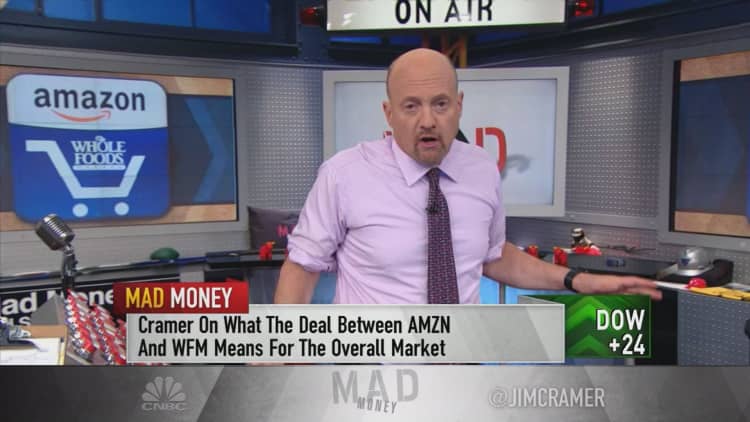
It's "too soon" to be scared for Wal-Mart based on news that Amazon plans to acquire grocer Whole Foods, Moody's retail analyst Charles O'Shea said.
In fact, Whole Foods wouldn't give e-commerce giant Amazon "any discernible edge," as Wal-Mart should remain the world's biggest retailer and biggest grocer, O'Shea wrote in a Wednesday note to clients. Wal-Mart will continue to grow its presence in peoples' lives at a rapid clip, he said.
It's true, Wal-Mart has the biggest share of the market, with about 14.5 percent of all U.S. food and grocery sales, according to estimates and analysis from GlobalData Retail.
Kroger is next in line, with a 7.2 percent stake. And Whole Foods and Amazon are smaller still, with Whole Foods controlling a 1.2 percent stake and Amazon with a mere 0.2 percent share of the grocery market.
As CEOs Jeff Bezos and John Mackey look to seal their disruptive supermarket deal, many rival companies' stocks have traded off, some posting double-digit declines on the Amazon-Whole Foods news.
Big-box retailer Wal-Mart, for example, fell more than 7 percent last Friday, when news of Amazon's proposed partnership broke. Meanwhile, shares of Target dropped more than 10 percent.
But O'Shea said Wal-Mart "still rules the grocery aisles," and Amazon isn't posing competition for the brick-and-mortar retailer so much as it's actually copying moves Wal-Mart made last year, when it bought Jet.com.
"We continue to believe that most US consumers will refrain from buying their groceries online," Moody's said. But, "[i]f online grocery delivery can ever reach scale, Walmart is the retailer that will benefit the most, as it has the most complete distribution network," retail analyst O'Shea added.
Buying groceries online remains challenging for many individuals who lack technology or access to digital platforms. O'Shea expects Amazon has recognized this obstacle by going after a brick-and-mortar retailer like Whole Foods, where it could also step in and lower the supermarket chain's prices.
But Wal-Mart's Neighborhood Market concept should be on everyone's radar, be it Amazon or Whole Foods, the Moody's analyst said. "The Neighborhood Market is ... the linchpin in the buy-online/pick-up-in-store grocery effort. The growth of the Neighborhood Market is the biggest risk for traditional supermarkets, including Whole Foods."
Much of Wall Street is still rallying this week around the idea that Amazon will dominate the future of the grocery business, but it remains to be seen how an Amazon-Whole Foods buy will pan out, if at all.
One analyst is even saying rival grocer Kroger should challenge Amazon and make Whole Foods a sweeter offer.
"Our view for the short to medium term is that for Walmart this moves the competitive needle a mere smidge," O'Shea said Wednesday. "Realistically speaking, a challenged $16 billion food retailer is merely changing owners."
Wal-Mart's stock was trading up about 1 percent Wednesday afternoon, clawing its way back after steeper declines to end last week.
Meanwhile, Whole Foods shares continued to hover above the $42 price tag that Amazon plans to pay, a sure sign investors are betting on a sweeter bid for the grocery chain.
Watch: Winners and losers of Amazon-Whole Foods deal



